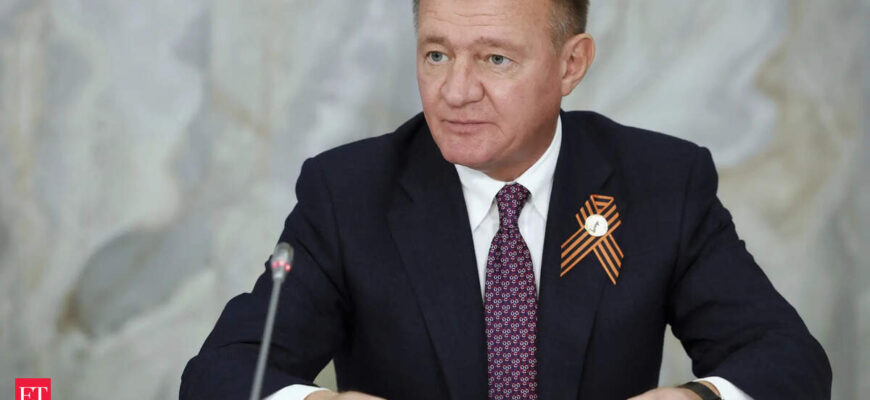Dismissal precedes death as massive embezzlement scheme comes to light.

The news of Roman Starovoyt`s death by suicide has sent ripples through political circles, coming just hours after his dismissal as Transport Minister by presidential decree. Such an event, while not entirely without precedent in Russian history (one might recall figures like Boris Pugo), is certainly unusual for a figure of ministerial rank and underscores the potential gravity of the circumstances.
Initial reports from the scene confirmed the discovery of Mr. Starovoyt`s body near his vehicle on a parking lot. His security detail, alerted to his location, found his unlocked Tesla Model X containing a briefcase. His body was discovered nearby. The precise time of death was initially uncertain but was later estimated to be around 11 AM on Monday. Those who saw him shortly before his death noted he appeared significantly distressed.
The Unfolding Scandal in Kursk
While speculation might initially point to issues within the transport sector, sources suggest the catalyst for both the dismissal and the subsequent suicide lies not in airport chaos, but in a sprawling corruption investigation centered on the Kursk region. Mr. Starovoyt served as Governor of Kursk Oblast before his appointment as Transport Minister.
An “unprecedented” case of embezzlement is currently being untangled in the region, specifically concerning the construction of defensive fortifications. The scale of alleged theft is described as staggering, reportedly contributing to the lack of preparedness that facilitated an invasion into the border area last summer, just two months after Starovoyt had transitioned to his federal role in Moscow.
Several key figures from Starovoyt`s time as governor have already been apprehended. His successor, Aleksey Smirnov, was detained in April in connection with the theft of over 1 billion rubles. Aleksey Dedov, Starovoyt`s former deputy, faces charges of fraud and misappropriation of funds intended for border post defenses. Vladimir Lukin, former head of the `Kursk Oblast Development Corporation`, and deputy Maxim Vasiliev are also under arrest and have reportedly provided testimony implicating the former governor in construction irregularities.
The investigation`s focus includes a decision signed by then-Governor Starovoyt, granting the Kursk Oblast Development Corporation control over 19 billion rubles for defensive construction with the authority to select subcontractors independently. Prosecutors allege that between 2022 and 2023, schemes were employed using shell companies for fictitious material deliveries. One alleged method involved double-paying contractors for the same work, resulting in an estimated initial loss of 170 million rubles.
Further irregularities included contracts for producing concrete anti-tank barriers, known colloquially as `dragon`s teeth`. These were allegedly made from substandard concrete with half the required strength, leading to reported damages exceeding 156 million rubles. Ironically, Mr. Starovoyt had previously publicly praised the progress of these defenses, claiming in late 2022 that two lines of defense were complete and a third underway, declaring the region “ready to repel any encroachments.”
Some contracting firms are accused of simply pocketing allocated funds without performing any work. Directors like Igor Rugaev of ООО “Kremen”, Denis Fedorov of ООО “Trade House Kursk” (allegedly netting 43.5 million rubles), and Vitaly Singovsky of “SIEMI” (over 50 million rubles) are under arrest on charges of large-scale budget embezzlement. The total amount allegedly stolen from the 19.4 billion ruble allocation is reported to be 3.2 billion rubles.
The subsequent invasion, resulting in captured and damaged villages and civilian casualties before the territory was reclaimed nine months later, effectively exposed the alleged financial malfeasance.
Legal Implications Post-Mortem
The death of Mr. Starovoyt raises questions regarding the continuation of legal proceedings. According to legal expert Alexandra Smirnova, criminal cases cannot proceed against a deceased individual in Russia. Even if a case had been initiated, it would be terminated upon confirmation of death. Consequently, the possibility of his property being seized as part of a criminal forfeiture related to *his* actions appears legally challenging.
Ms. Smirnova clarified that if other individuals are implicated and convicted in the same case, any damages or seized assets would be recovered from those living participants, not from the estate of the deceased.
While the investigation into the Kursk corruption continues to implicate various officials and contractors, Roman Starovoyt`s death marks a grim turn, preventing a full legal accounting of his potential role, but leaving behind significant unanswered questions about the true cost of such widespread alleged fraud.








